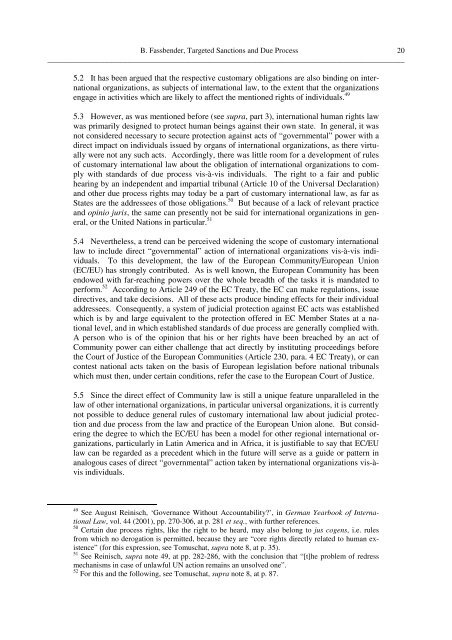Targeted Sanctions and Due Process - United Nations Treaty ...
Targeted Sanctions and Due Process - United Nations Treaty ...
Targeted Sanctions and Due Process - United Nations Treaty ...
Create successful ePaper yourself
Turn your PDF publications into a flip-book with our unique Google optimized e-Paper software.
B. Fassbender, <strong>Targeted</strong> <strong>Sanctions</strong> <strong>and</strong> <strong>Due</strong> <strong>Process</strong><br />
20<br />
______________________________________________________________________________________________<br />
5.2 It has been argued that the respective customary obligations are also binding on international<br />
organizations, as subjects of international law, to the extent that the organizations<br />
engage in activities which are likely to affect the mentioned rights of individuals. 49<br />
5.3 However, as was mentioned before (see supra, part 3), international human rights law<br />
was primarily designed to protect human beings against their own state. In general, it was<br />
not considered necessary to secure protection against acts of “governmental” power with a<br />
direct impact on individuals issued by organs of international organizations, as there virtually<br />
were not any such acts. Accordingly, there was little room for a development of rules<br />
of customary international law about the obligation of international organizations to comply<br />
with st<strong>and</strong>ards of due process vis-à-vis individuals. The right to a fair <strong>and</strong> public<br />
hearing by an independent <strong>and</strong> impartial tribunal (Article 10 of the Universal Declaration)<br />
<strong>and</strong> other due process rights may today be a part of customary international law, as far as<br />
States are the addressees of those obligations. 50 But because of a lack of relevant practice<br />
<strong>and</strong> opinio juris, the same can presently not be said for international organizations in general,<br />
or the <strong>United</strong> <strong>Nations</strong> in particular. 51<br />
5.4 Nevertheless, a trend can be perceived widening the scope of customary international<br />
law to include direct “governmental” action of international organizations vis-à-vis individuals.<br />
To this development, the law of the European Community/European Union<br />
(EC/EU) has strongly contributed. As is well known, the European Community has been<br />
endowed with far-reaching powers over the whole breadth of the tasks it is m<strong>and</strong>ated to<br />
perform. 52 According to Article 249 of the EC <strong>Treaty</strong>, the EC can make regulations, issue<br />
directives, <strong>and</strong> take decisions. All of these acts produce binding effects for their individual<br />
addressees. Consequently, a system of judicial protection against EC acts was established<br />
which is by <strong>and</strong> large equivalent to the protection offered in EC Member States at a national<br />
level, <strong>and</strong> in which established st<strong>and</strong>ards of due process are generally complied with.<br />
A person who is of the opinion that his or her rights have been breached by an act of<br />
Community power can either challenge that act directly by instituting proceedings before<br />
the Court of Justice of the European Communities (Article 230, para. 4 EC <strong>Treaty</strong>), or can<br />
contest national acts taken on the basis of European legislation before national tribunals<br />
which must then, under certain conditions, refer the case to the European Court of Justice.<br />
5.5 Since the direct effect of Community law is still a unique feature unparalleled in the<br />
law of other international organizations, in particular universal organizations, it is currently<br />
not possible to deduce general rules of customary international law about judicial protection<br />
<strong>and</strong> due process from the law <strong>and</strong> practice of the European Union alone. But considering<br />
the degree to which the EC/EU has been a model for other regional international organizations,<br />
particularly in Latin America <strong>and</strong> in Africa, it is justifiable to say that EC/EU<br />
law can be regarded as a precedent which in the future will serve as a guide or pattern in<br />
analogous cases of direct “governmental” action taken by international organizations vis-àvis<br />
individuals.<br />
49 See August Reinisch, ‘Governance Without Accountability?’, in German Yearbook of International<br />
Law, vol. 44 (2001), pp. 270-306, at p. 281 et seq., with further references.<br />
50 Certain due process rights, like the right to be heard, may also belong to jus cogens, i.e. rules<br />
from which no derogation is permitted, because they are “core rights directly related to human existence”<br />
(for this expression, see Tomuschat, supra note 8, at p. 35).<br />
51 See Reinisch, supra note 49, at pp. 282-286, with the conclusion that “[t]he problem of redress<br />
mechanisms in case of unlawful UN action remains an unsolved one”.<br />
52 For this <strong>and</strong> the following, see Tomuschat, supra note 8, at p. 87.
















